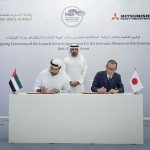The deal lays the foundation for establishing a UNOOSA centre in the UAE to act as a new global hub to foster progress on space sustainability and space for development issues.

The UAE Space Agency and The United Nations Office for Outer Space Affairs (UNOOSA) held a digital signing ceremony today to discuss the creation of an international UNOOSA project office in the nations capital, Abu Dhabi. The meeting is part of an effort to increase collaboration on the long-term sustainability of space activities and promote the use of space for sustainable development.
The agreement was signed by His Excellency Dr. Mohammed Al Ahbabi, Director-General of the UAE Space Agency and Simonetta Di Pippo, Director of the United Nations Office for Outer Space Affairs and was attended by several officials of both parties. This marks the first bilateral international agreement signed by the UAE Space Agency through video conferencing.
This collaboration will see the convening of the global space sector to support dialogue, research and trend-analysis, and reinforce efforts to catalogue best practices to accelerate sustainable development. The UNOOSA office plans on focusing on two main areas: It will enhance the role of the space sector in achieving the United Nations Sustainable Development Goals (SDGs) and apply sustainability standards in space activities at nationally, regionally and globally.
This strategic move comes in line with the UAEs goals to establish sustainable and diversified economic growth across all sectors, including the burgeoning space sector and its various activities, in a manner consistent with the principles set by the United Nations Committee of Peaceful Uses of Outer Space (COPUOS). In line with the UN Sustainable Development Goals (SDGs) for international cooperation in the peaceful uses of outer space, it serves the long-term goals of both parties involved.
UAE Space Agency Director General, His Excellency Dr Mohammed Al Ahbabi said: The UAE Space Agency is pleased to collaborate with UNOOSA in the effort to ensure sustainable development in outer space so that all of humanity can continue to benefit from its uses for peaceful purposes and socioeconomic benefit now and in the long term. We look forward to continuing fruitful dialogue designed to accelerate the global space sectors contribution to humanitys aspirations.
UNOOSA Director Simonetta Di Pippo added: Through this agreement, UNOOSA and the UAE take a big step towards establishing a new international hub for space sustainability. With space technology accelerating sustainable development around the world and global investment in the space environment increasing, now is the time to strengthen global dialogue on space sustainability issues. Governments, private sector and academias support and investment in space activities needs to be reinforced more than ever. This office will further highlight the UAEs role in developing policies and programs in the space sector. And, with its steadfast commitment to the Sustainable Development Goals and significant achievements in the space sector, the UAE the perfect partner for this ambitious plan.
During the ceremony, His Excellency presented the key milestones reached in the UAEs space sector such as the Emirates Mars Mission (EMM), which is scheduled to launch in mid-July, and the nations achievements in the space sector that include the launch of the second phase of the UAE Astronaut Programme, advancements in policies and regulations, and accelerators and incubator programs for startups and entrepreneurs.
Additionally, His Excellency provided important updates from UAE educational institutions that support the space sector through education in space science, research, technology and applications. He further reviewed the latest developments and activities from the Arab Space Cooperation Group, a collaboration of 14 Arab countries, that is working on their inaugural project, 813 Satellite.
Space exploration is booming, with more than 80 countries having launched satellites since 1957, of which over 2,500 are currently operational, according to UNOOSA estimates. This points to both a lively and rapidly evolving global space sector, as well as a clear need to reinforce dialogue and the exchange of best practices among both established and emerging space-faring nations.
Moreover, the benefits of space for sustainable development are increasingly evident. The growth of space applications all over the world presents an unprecedented opportunity to accelerate global sustainable development. It is therefore crucial that more countries have access to space and space data, something UNOOSA is working on with its Access to Space 4 All Initiative.
















































































